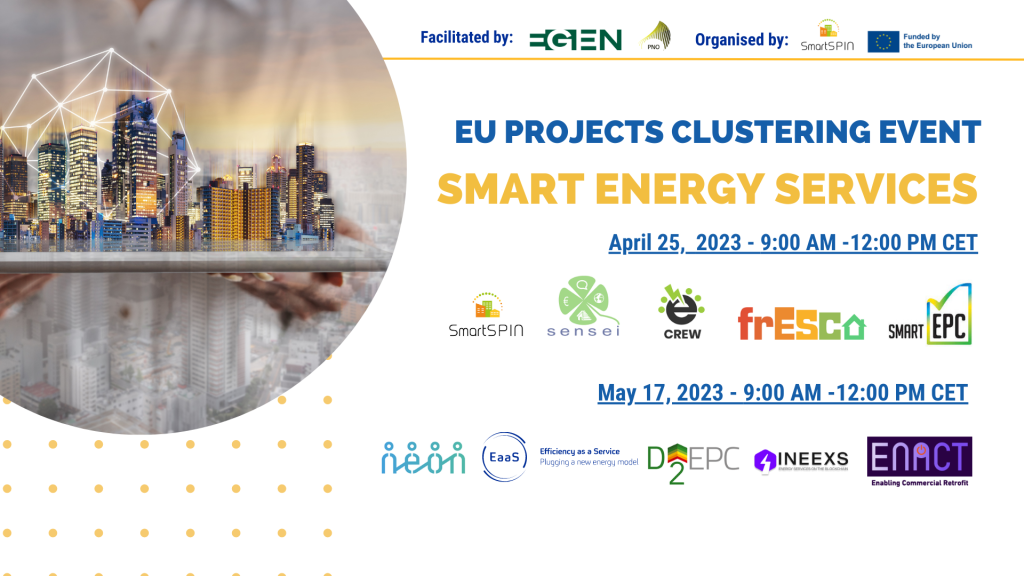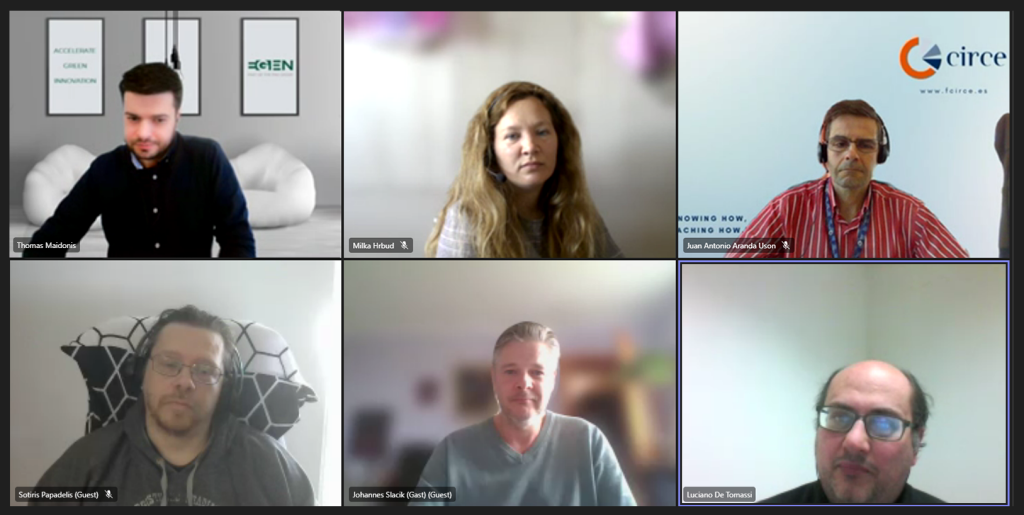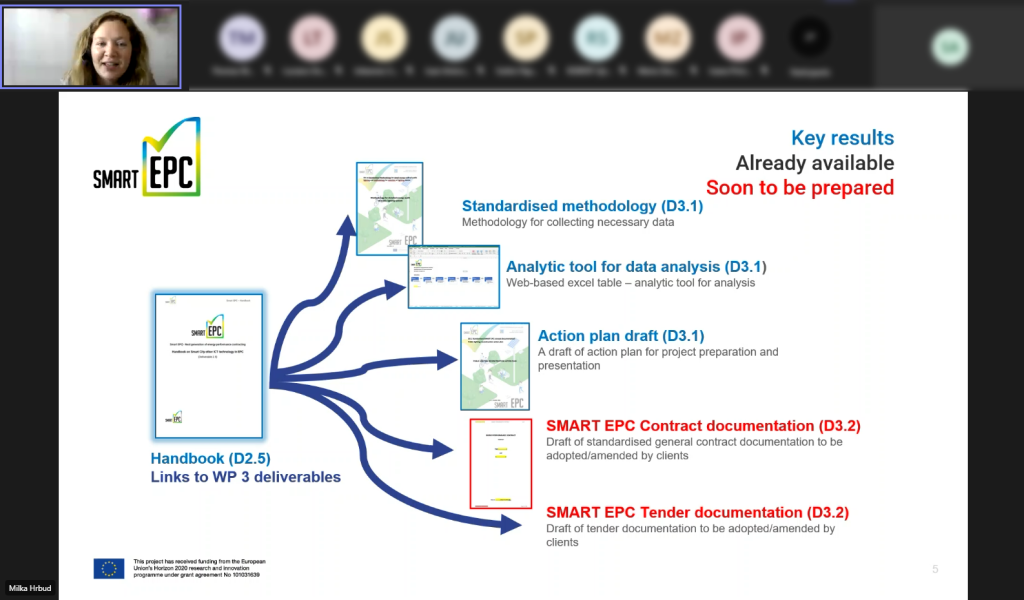Barriers to accelerating progress toward a smarter and more efficient energy system
In the spring of 2023, the SmartSPIN project organised the EU project clustering event “Smart Energy Services”, bringing together top research organisations as well as industrial partners to present their project results, best practices, and the new smart energy services that will improve energy efficiency and flexibility.
With the moderation of Thomas Maidonis from EGEN, the event brought the occasion to exchange on insights and activities carried out, to get up-to-speed with the emerging role of smart energy services in Europe. It concluded with a discussion on the barriers and challenges to accelerate progress towards smarter and more efficient buildings and energy systems.
Five European projects have been sharing their input: Smart EPC (represented by Milka Hrbud, REGEA), eCrew (Johannes Slacik, JKU Linz), SENSEI (Sotiris Papadelis, HEBES Intelligence), SmartSPIN (Luciano De Tomassi, IERC), and frESCO (Juan Antonio Aranda Uson, CIRCE).

‘‘What are the barriers to accelerate progress towards a smarter and more efficient energy system?’’
In the context of achieving a smarter and more efficient energy system, there are universal obstacles such as technological limitations, financial constraints, regulatory complexities, and resistance to change. Together with external factors such as climate change, these challenges are not unique to a specific region, sector, or organisation but are instead overarching difficulties that are encountered by many entities working towards similar goals.
There is mutual agreement within the represented projects on the general limited knowledge of the opportunities of energy efficiency as a business model and the differences in national regulations across Europe as the main challenges faced.
eCrew, a project coordinating and supporting the roll-out of community renewable energy webs in Germany, Spain, and Turkey, is primarily impacted by the difference in national regulations and this is the barrier they wish to highlight. Using a best practice business model, they cannot replicate their own systems and best practices one-to-one due to the difference in regulations. They notice these restrictions eventually hinder the growth of energy communities.
The SmartSPIN project is proposing smart energy services to solve the Split Incentive problem in the commercial rented sector; in 2023 they have launched an interactive web app showing the potential for energy management in EPC in commercial buildings.
When performing a review of the Smart energy services markets across EU they noticed that many of these national markets are not yet well developed. In Ireland and Spain these markets are growing but have not reached maturity yet, whereas in Greece the market is still in its very early stages. Most of potential clients in the commercial rented sector have no knowledge about energy efficiency as a service business model, which means that the ESCOs can deliver energy efficiency and be rewarded for the energy efficiency they deliver. A third barrier that Smart SPIN recognises is the limited awareness regarding the opportunities that there are in the commercial rented sector to implement this business model – the energy efficiency as a service and overcoming the split incentive, hence defining a fair and transparent split of the benefits of the energy efficiency, between the landlords/tenants and ESCOs.
SENSEI has been the first project to investigate Pay-for-Performance (P4P) in an EU context. As such, it differs to other projects. “The concept of pay for performance, at least as you can see it in the USA, is 100% policy driven. Does it make sense for such policy to be implemented in Europe?” The SENSEI team concluded affirmatively, as P4P is also a way to increase accountability.
Regulation is needed
Energy efficiency should be regarded as something very different and separated from the power system. Energy agencies and authorities ask for a successful example in Europe, otherwise they are not interested. Therefore, there is a “need of some kind of regulation to kick start it.” With these into place, a multitude of mechanisms could be set up to help energy efficiency business models independently of payroll formats.

frESCO proposes new business models for innovative energy service bundle for residential consumers, and it is currently demonstrating operation in four representative pilot sites in the Southern part of Europe. With the lack of unified regulations in Europe, the directives have been transposed;especially concerning demand, flexibility is one of the main barriers encountered. An additional barrier is the mistrust due to data sharing when it comes to data data-driven services where users are data providers; many people are still reluctant, especially when talking about deployment of explicit strategies. Only explicit flexibility can warranty on a given amount of committed flexibility to the market. For obtaining explicit flexibility, we need to break the mistrust for automated control strategies.
The Smart EPC consortium has encountered several of the mentioned universal barriers in their work to enable the transition of local public authorities towards smart sustainable cities. The barriers and challenges identified have also been collected in the Smart EPC Handbook for Smart City and other ICT technology in ICT.
From the start, the EPC model is not universally applicable.
The assessment of the appropriation of the sanitary construction model for each building or public lighting system is one of the most important steps in the project preparation, and each project needs to be looked individually. In addition, the EPC model is not suitable for small buildings and public lighting systems, considering the return of the investment.
Coming to challenges specific to the public lighting system reconstruction, Smart EPC notes the mixture of financing means, the need for detailed analysis of the existing state of the infrastructure (e.g. detailed energy audit), and legal issues regarding ownership facilities.
These issues might be more easily solved in public lighting systems than in buildings. Smart EPC is looking to be “an intermediate step in boosting the market towards buildings.”
Next to training and facilitation of services, the main tool developed through the Smart EPC project is the standardised documentation on European level. With various chapters and annexes, the documentation can be tailored to specific conditions. During the project tests in France, Poland, and Spain, the documentation will be revised and improved.

The diversity of the European continent comes with challenges in the replicability of examples and good practices from one country to another. By identifying and addressing these challenges, it becomes possible to develop strategies and solutions that can be applicable across different contexts. These challenges may require collaborative efforts and shared knowledge to overcome. As the representative of the frESCO project pointed out during the event, “we might need successful stories to start breaking the lack of confidence; and this is one of the things that these projects are about, to try to test and break this initial lack of trust from many end users.”
